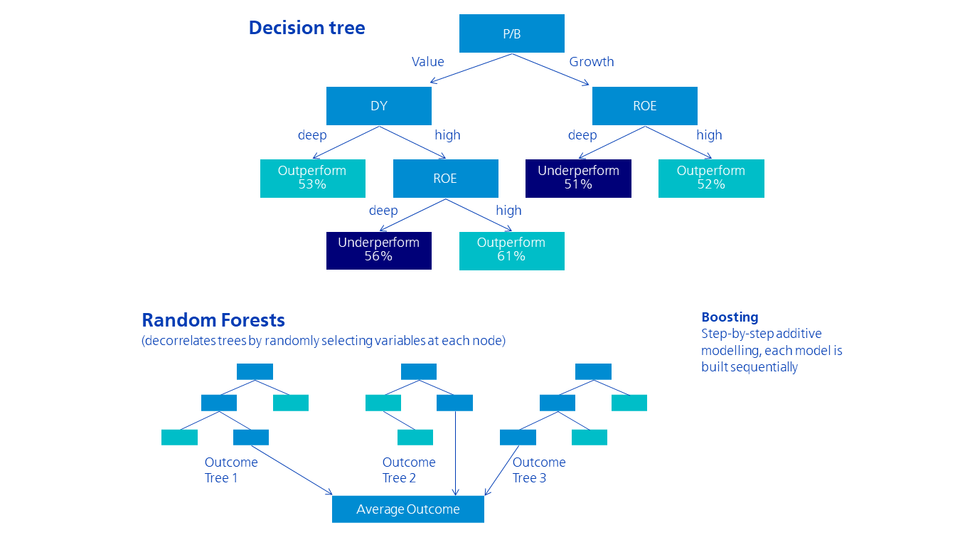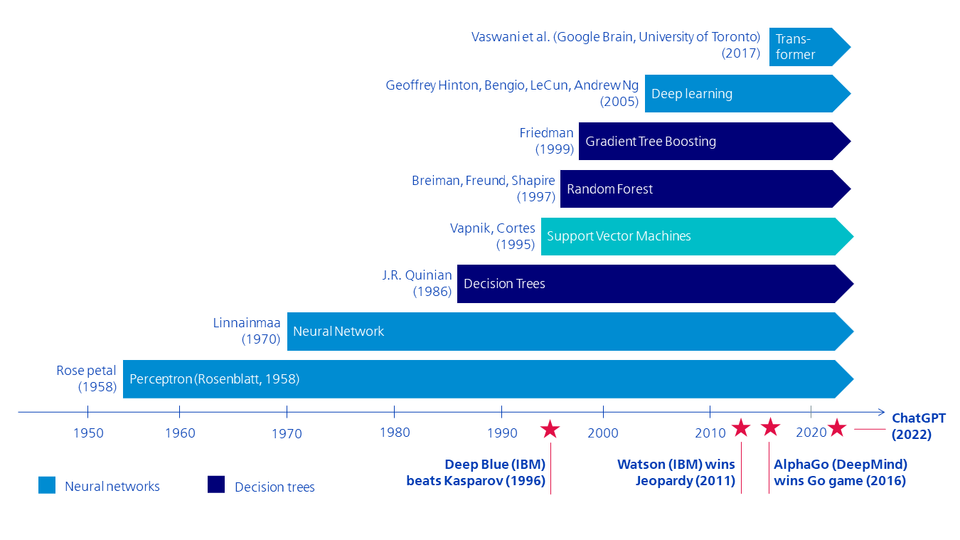Milestones on the road to artificial intelligence
Just as electricity revolutionised life in the 19th century, artificial intelligence has the potential to fundamentally change our society and economy. How did this come about and what were the most important milestones?
Author: Stefan Fröhlich, Portfolio Manager Systematic Equities

OpenAI's ChatGPT skyrocketed in popularity in 2022. In just five days, ChatGPT reached more than one million users. By comparison, it took Facebook ten months and Netflix three and a half years. ChatGPT has thus helped artificial intelligence (AI) achieve a breakthrough among the general public.
Key milestones in artificial intelligence
The concrete realisation of AI began in the 1950s with the invention of a single cell (perceptron) and the discovery of the neural network in the 1970s. However, these networks failed to achieve a major breakthrough because computers at the time had too little computing power and the data sets were too small to train the algorithms efficiently. Decision trees became popular in the 1980s and 1990s. As a single decision tree is transparent, but the predictive power is low, random forest and boosting algorithms combine different decision trees, which significantly improves the forecasts.

Since the 2000s, advances in computing power and the availability of large data sets have led to a renaissance of neural networks in the form of deep learning. While a neural network consists of only one layer of individual cells, deep neural networks (deep learning) link several hidden layers together. This revolutionised AI research, enabled ground-breaking advances, particularly in image and speech recognition, and led to the breakthrough of artificial intelligence in IT companies from 2010.
The Transformer architecture, invented in 2017, is another milestone in the development of artificial intelligence and is revolutionising large language models (LLMs). Thanks to the Transformer algorithm, large language models are able to process text, understand the context and derive answers from it. ChatGPT-3 was released in 2022 and enables users to use natural language for a variety of tasks, from text creation to code generation.

Chatbots have rapidly gained in importance over the last two years and have fascinated millions of users in a very short space of time. However, this technological revolution means that the history book of artificial intelligence is far from over - it is only just beginning. Computing power (GPUs) is increasing rapidly thanks to billions in investment by large IT companies such as Nvidia, enabling ever more comprehensive and powerful models. At present, the human brain, with around 100 trillion synapses, is still more complex than the largest AI models. This could change in the coming years and significantly alter our society and future economic development.
Artificial intelligence in asset management?
Machine learning algorithms can be used to forecast future equity returns and tap into sources of alpha that often remain hidden from humans. They therefore represent a promising addition to traditional investment approaches.
The most important terms in the context of AI
Artificial intelligence has given rise to a variety of terms. Here is a categorisation:
- Artificial intelligence (AI) refers to the ability of machines to perform tasks that would normally require human intelligence. This applies to all facets of life. This includes the ability to see, move, think, solve problems step by step or invent new things.
- One area of AI is machine learning (ML). This involves algorithms learning from data, recognising correlations and patterns independently and making predictions from them.
- An algorithm is a process that can be used to solve problems.
- In generative AI, creative content (e.g. texts, images or videos) is generated with the help of deep learning techniques.
- Prompting describes the input of prompts to a language model in order to obtain specific answers or results. Efficient prompting is becoming increasingly important for AI applications and can be compared to the way you search for information by googling.
- Superintelligence is the term used when human intelligence is surpassed.


